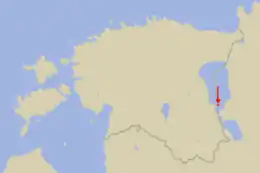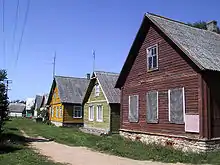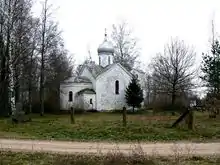Piirissaar
Piirissaar (earlier Borka, Russian: Межа, romanized: Mezha) is an Estonian island located in Lake Peipus. It belongs to Tartu County as the Piirissaare Parish.
 | |
| Geography | |
|---|---|
| Location | Lake Peipus |
| Area | 7.5 km2 (2.9 sq mi) |
| Administration | |
| Tartu County | |
| Official name | Emajoe Suursoo Mire and Piirissaar Island |
| Designated | 5 June 1997 |
| Reference no. | 906[1] |


Piirissar is the largest island in Lake Peipus with a size of 7.8 km². It is located c. 15 km from the mouth of the Emajõgi river. Piirissaar is located c. 1 – 2 meters above the water level in Lake Peipus.
The island was first permanently settled during the Great Northern War by a group of Orthodox Old Believers seeking to escape the religious reforms of Moscow Patriarch Nikon and trying to avoid enrollment in the military. Most of the island's inhabitants still belong to this confession. The inhabitants of Piirissaar are diligent gardeners and vegetable growers, especially onion growers.
The German Luftwaffe inflicted major damage on the island in February 1944.
There are three villages on the island, Piiri, Saare and Tooni. The number of inhabitants has dropped from c. 700 in 1920 to 86 by 2006. The remaining inhabitants are mostly occupied by fishing and cultivation of onions.
Piirissaar has been a nature preserve as part of the Natura 2000 programme since 1991.
See also
External links
- Island website (in Estonian and Russian)
- Pilt Eesti Maa-ameti kaardiserverist - остров на электронной карте Эстонского Земельного департамента (in Estonian and Russian)
- 360-Degree Airiel Panorama of Piirissaar from Helicopter
References
- "Emajoe Suursoo Mire and Piirissaar Island". Ramsar Sites Information Service. Retrieved 25 May 2020.
